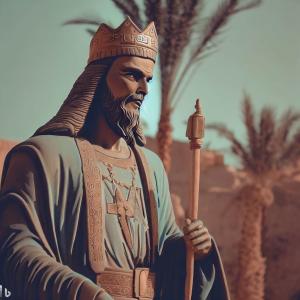
Today we break from our Women In The Bible series to hear from our guest blogger, Joseph DeWayne Parks RN, BSN. Joseph is going to teach about the historicity of Joseph from the Bible. Please stay tuned for the continuation of the Women In The Bible series this Friday. In the meantime, here is The Historicity of Joseph.
August 3, 2023
Joseph (יוֹסֵף) is perhaps the most famous of the Hebrew patriarchs. This is due to the dramatic journey he takes. That journey occurred because his brothers betrayed him and sold him into slavery in Egypt. While in Egypt, Joseph faces multiple ups and down. He is sold to a member of the pharaonic court, is falsely accused of rape by his master’s wife, and is tossed into prison for a crime he didn’t commit. However, it would be Joseph’s God-given talent of interpreting dreams that would allow him to provide help to the pharaoh. By doing this, he became a free man. However, he also became the second most powerful man in the Egyptian Empire. Joseph’s story ends with him being reunited with his family and the Israelites finding a new home in Egypt.
Dating of Joseph’s Story
While we have no archaeological evidence or Egyptian records that identify Joseph as a real historical figure, Joseph is the Hebrew patriarch that has the most credible historicity. This is thanks to the Egyptian background of his story. Most biblical scholars and Egyptologists date the timeframe of Joseph’s story to the Second Intermediate Period (c. 1782-1570 B.C.).
During this period of Egyptian history, Egypt was divided between the Hyksos and the native Egyptian pharaohs. The Hyksos ruled over Lower Egypt from their capital city of Avaris. The native Egyptian pharaohs ruled over Upper Egypt from Thebes.
Hyksos
The Hyksos were a Semitic people who immigrated to the Nile Delta. They conquered the region and ruled from their capital city of Avaris. The Hyksos adopted Egyptian culture. They combined elements of both Syro-Palestinian and Egyptian cultures. This is evidenced by their worshipping both Canaanite and Egyptian deities, utilizing elements of both Syro-Palestinian and Egyptian architecture in their buildings, writing in Egyptian hieroglyphs, and styling themselves as pharaohs. The Hyksos introduced several technological and cultural practices to the ancient Egyptians. These included the worship of several Canaanite deities, such as Baal and Anath. They also introduced the use of chariots, the use of sickle swords, the use of the composite bow, the construction of city walls, and the use of iron for tools and weapons.
Joseph’s Egypt is closest to Egypt under the Hyksos. This is because Joseph encounters elements of Hyksos culture. Such elements include the elevation of Semitic peoples to high ranks of authority in the Egyptian government, the use of iron shackles while he was a slave, and the pharaoh’s gift of a chariot when he became the grand vizier. the gift of a chariot can be seen in Genesis 41:43. According to Psalm 105:18, they used iron shackles.
It is interesting that after Joseph is reunited with his father Jacob, Jacob is given depicted as giving a blessing before the pharaoh. This is according to Genesis 47:7. While this could be a unique case of interfaith dialogue between a follower of the ancient Israelite religion and a follower of Egyptian paganism, it can also be seen as a peaceful dialogue between two Semitic rulers, a Hebrew patriarch, and a Hyksos pharaoh.
Accurate Cultural Details
Furthermore, the purely Egyptian elements such as place names, personal names, and customs mentioned in Joseph’s story also correlate to authentic Egyptian culture during this period. According to Genesis 37:28, Joseph was sold into slavery by his brothers to the Ishmaelites for 20 pieces of silver. This accurately reflects the average price of a slave in both Canaan and Egypt during ca. 1500 B.C.
Unlike slavery in pre-Civil War America, slavery in ancient Egypt was not based on race and was not chattel slavery. Most Egyptian slaves were of Semitic, Libyan, or Nubian origin. They became slaves because of being prisoners of war, being captured by the Egyptian army during slave raids, or being purchased from foreign slave markets.
However, native Egyptians could also become slaves, as a punishment for certain crimes or to pay off debts. Many Egyptian slaves did have a few rights granted to them by the law. They could find opportunities to gain their freedom and climb up the social ladder of Egyptian society. To do this they needed wealth, education, or social connections. While the Hebrew term for “slave” is used in the text, I thought it would be interesting to share the Egyptian words for “slave.” They are “ḥm” for “male slave” and “ḥmt” for a female slave. These are the words Joseph would have heard himself be called.
Joseph’s Promotion
When in Egypt, Joseph is sold again. The Ishmaelites sell him to an Egyptian man named Potiphar (פּוֹטִיפָר). Potiphar is identified as the captain of the royal guard. Potiphar’s name is an authentic ancient Egyptian name! Transliterated from the hieroglyphs as pꜣ-dj-pꜣ-rꜥ, Potiphar’s name means “he whom Ra has given”. The position of “captain of the royal guard” also indicates Potiphar was a military professional.
The closest I’ve found to Potiphar’s biblical title of “captain of the royal guard” in my reference sources of the ancient Egyptian language is the imy-r mSa wr. That translates to “overseer of the army”
While a household slave in Potiphar’s house, Potiphar elevates Joseph to the position of overseer of the household. This position was in charge of managing the other servants and slaves of one’s household. This can be read about in Genesis 39:4. The concept of having an overseer of the household is of purely Egyptian origin. There are many examples of servants and slaves being awarded this title by their masters in Egyptian records. In ancient Egyptian, this job title would have been called imy-r pr.
Joseph Accused
As Joseph continues to survive and flourish underneath his benevolent master, he soon finds himself in a dangerous situation. The unnamed wife of Potiphar wants Joseph to have an affair with her. Joseph refused to sleep with his mistress out of respect for both God and his Egyptian master. Because of this, Potiphar’s wife became furious. She lied to her husband, saying that Joseph attempted to rape her. She used his ripped garments as proof of the alleged assault.
Upon hearing this information, Potiphar has Joseph arrested and placed in prison. But if Potiphar truly believed that his wife was raped why didn’t he kill Joseph? Although we have no surviving law codes from ancient Egypt, written documentation from surviving court cases reveals rape was seen as a very serious crime in ancient Egypt. Rape could result in the execution of the rapist or the mutilation of the rapist’s genitals. So, why was Potiphar being so merciful with Joseph?
Prison
This is a question that even rabbis have discussed at length in the rabbinical literature. This literature was from after the composition of the Torah. According to Targum Jonathan’s commentary on Genesis 39:20, Joseph’s prison sentence resulted from Potiphar consulting a counsel of priests for the appropriate punishment. The consultation of priests, who served as the oracle of a god, was a common practice in ancient Egyptian courts. Many final decisions were made by these priests, after consulting their god. Therefore, this rabbinical commentary from centuries after the composition of the Torah is surprisingly accurate.
Pharoh Believed Joseph?
It’s also possible that Potiphar knew that his wife was unfaithful and believed Joseph. However, a political scandal would have arisen from word breaking that an Egyptian noblewoman had an affair with a Semitic household slave. Therefore, Potiphar decided to quietly give Joseph a minor punishment, to save the dignity of his household.
From a purely literary analysis of the text, one can also see that Potiphar’s wife plays the role of the ‘adulterous wife.’ This is a stock character commonly found in many works of ancient Egyptian literature. She serves as a source of conflict. This is seen in “The Tale of Two Brothers” for example. In this story, one brother named Anpu plots to kill the other brother, Bata. This is due to Anpu’s wife falsely accusing Bata of sexually and physically assaulting her. Like The Pharoh’s wife, the reason was a result of him not wanting to have an affair with her.
The History of Prisons
Joseph was placed in prison for his mistress’ lies. The mention of prisons is another uniquely Egyptian element of Joseph’s story. The usage of prisons originated in Egypt. These prisons would have been stone quarries located in the desert. Having a ‘prison’ that is essentially a giant hole in the ground surrounded by desert doesn’t sound like a secure place to keep criminals. However, no walls or jail cells were needed to keep the condemned in place. The harsh conditions of the desert kept many from attempting to escape. The prison was the only place where they could find shelter from the elements.
Punishment in an ancient Egyptian prison would consist of hard labor in the stone quarry and various forms of corporal punishment. Corporal punishments included things like beatings and whippings. Eventually, the warden of the prison found potential in Joseph, just like Potiphar had before him. He made Joseph the overseer of the prison, as stated in Genesis 39:22. While the text uses the Hebrew term for “prison”, I thought it would be interesting to show the Egyptian word for “prison.” The Egyptian word is “ḫnrt.”
Joseph Meets the Cupbearer and Baker
While in prison, Joseph meets two members of the pharaoh’s court. They are the chief cupbearer and the chief baker. In the ancient world, a cupbearer was a servant who was given the task of handling the wine and other drinks of a king. This job title now seems odd and outdated. However, servants who worked as cupbearers were generally the most trusted member of an ancient royal court. This is because the cupbearer kept the king safe from attempted poisoning. Bakers were both a common and vital profession in ancient Egypt. This is because bread was the stable of the Egyptian diet. Bakers were experts at making various types of baked goods. These included cakes and specialty breads, shaped like animals. Like the cupbearer, royal bakers were also responsible for ensuring food safety for the king.
Assassination Attempt
The chief cupbearer and the chief baker found themselves in prison because they got on the pharaoh’s bad side. This is stated in Genesis 40:1. While the Book of Genesis is silent on the details of their suspected crimes, several rabbinical texts composed centuries later try making suggestions. For example, Targum Jonathan’s commentary on Genesis 40:1 reports that the chief cupbearer and chief baker were arrested for plotting to poison the pharaoh. Chizkumi claims that the problem was the poor quality of food service. He says the cupbearer diluted the pharaoh’s wine with water. Chizkumi claimed the baker got small stones mixed into the dough that was meant for the pharaoh’s bread.
The text in the Book of Genesis uses the Hebrew terms for “cupbearer” and “baker.” However, I thought it would be interesting to show how the Egyptian words for these job titles would appear in hieroglyphs. The Egyptian word for “cupbearer” would be “wb,ꜣ” while the word for “baker” would be “rtHty”.
Dream Interpretation
While in prison, the chief cupbearer and the chief baker suffer from strange dreams. They are distressed at the fact that they don’t have access to a dream interpreter, to help them understand these nightmares. In ancient Egypt, dream interpretation was a common practice. It was believed that the gods communicated to humans through their dreams. The meanings of dreams could be interpreted by priests. Ancient Egyptian physicians were also trained in dream interpretation. This was because it was believed that the gods associated with healing could plant clues in a patient’s dreams. These clues would help the physician heal the patient.
Dream interpretation, in the Bible and the ancient world, should not be confused with the Freudian approach to dream interpretation, as performed in psychanalysis. According to Freud, dreams were messages from the unconscious mind to the conscious mind. Freud said that dreams contain clues that can be used to shed light on a patient’s psychological issues. These issues are rooted in the unconscious mind. They can include childhood trauma, fears, and sexual desires. Joseph could interpret dreams, thanks to God’s blessing. Joseph credited God for the interpretations.
Joseph’s Release
Because Joseph was able to correctly interpret the dreams of the chief cupbearer and the chief baker, word of Joseph’s skills spread to the royal court. Joseph was eventually released from prison by the pharaoh himself, due to The Pharoh needing an interrupter to solve the meaning behind his nightmares. The pharaoh needed an interpreter since none of the “magicians” who served him could give him an answer. It is important to note that when the Torah uses the term “magician”, it is not making a reference to performers of magic like one associates with modern magic, such as circus or stage magicians. The Hebrew word for “magician” is actually a transliteration of the ancient Egyptian word “ḥry-tp ẖry-ḥbt”, which literally means “chief lector priest” or a priest that is trained in the magical practices associated with the ancient Egyptian religion.
Which Pharaoh?
Because the pharaoh is unnamed by the author(s) of the Book of Genesis, he cannot be accurately placed on the timeline that matches him with the known pharaohs who ruled during the Second Intermediate Period. However, the pharaoh elevating Joseph, a foreign-born slave, to the rank of grand vizier does correlate with known governmental policies at that time. The pharaoh’s gifts of linen garments, a gold collar necklace, a signet ring, and a chariot also match with gifts that pharaohs would give to both foreign dignitaries and members of the royal court.
Regarding the pharaoh’s dream, Joseph was able to predict that seven years of the bountiful harvest would come to Egypt followed by seven years of harsh famine. While famines were common in Egypt because of occasional low flooding of the Nile, the Bible’s reference to a famine lasting seven years may come from reports of such a natural disaster happening during the reign of Pharaoh Djoser (r. 2592 – 2566 B.C.), during the Old Kingdom. While this is too late of a date for the Joseph story, the biblical authors could be intensifying the severity of the famine by referring to older Egyptian records.
New Name
Along with the new job and gifts, the pharaoh also gives Joseph a new Egyptian name – Zaphenath-paneah (צָפְנַת פַּעְנֵחַ). This name is an authentic Egyptian name according to Egyptologists, but no ancient Egyptian documents or monuments have been found that bear this name. The name also has differing translations. However, the most widely accepted meaning of Joseph’s new name is “the god peaks and he lives”.
Also, the pharaoh awards Joseph with an Egyptian wife named Asenath (אָסְנַת). Asenath is an authentic Egyptian name that means “she who is of Neith”.
Joseph’s Wife
Asenath is stated in the Book of Genesis to be the daughter of a priest named Potipherah (פּוֹטִי פֶרַע). Potipherah is a different way of saying the same name of Joseph’s former master Potiphar, “he that Ra has given”. While these two men share the same name, it is unlikely that they are the same person since Potipher has a military profession and Potipherah is a priest. These two job titles are too distinct for one person to have.
Based on his name and the city he served as high priest, it can be assumed that Potipherah was a high priest of Ra, the ancient Egyptian god of the Sun. Potipherah is called the high priest at On. On is the Hebrew name for the ancient Egyptian city of Heliopolis. Heliopolis means “city of the Sun” in ancient Greek. It was given that name by ancient Greeks and Romans due to it being the holy city of the Cult of Ra. The ancient Egyptian name for this city was “Iwnw” which means “The Pillars”.
Marriage To a Foreigner
The authors of the Book of Genesis do not state anything negative about Joseph marrying Asaneth, who would have been an Egyptian pagan. However, many later Jewish writers found it disturbing and composed rabbinical literature and extra-biblical texts that claimed that Asenath either converted to Judaism before their marriage (as claimed in the extra-biblical text “Joseph and Asenath”) or was secretly Jewish. This claim by the Midrash and Targum Jonathan states that she was the biological daughter of Jacob’s daughter Dinah and the Canaanite prince who raped her, She was later adopted by Potiphar and his unnamed wife.
However, it is more likely that no one at the time would have found anything objectable to the marriage of a Hebrew and an Egyptian pagan. There are later examples of Jewish men taking pagan wives throughout the Bible. These include Moses and his Ethiopian wife and King Solomon and his wives of various ethnic origins.
Joseph’s Titles
The fact that the role of grand vizier includes various responsibilities, it can be assumed that Joseph was intelligent and had a proper education. The responsibilities of this role included dictating agricultural procedures and practices to the peasant farmers, running the treasury, appointing generals for the military, making plans for the construction of the pharaoh’s monuments and tomb, making plans for the construction of Egypt’s infrastructure like roads and canals, and appointing high priests for the temples
Joseph was also granted several role titles that were real titles awarded to members of the pharaoh’s court. One of these titles was “father to Pharaoh”, as seen in Genesis 45:8. This appears to be a Hebrew rendering of the Egyptian title of “God’s father”, which was a title held by advisors of the pharaoh. They were called this because they were to serve as a source of wisdom and guidance to the pharaoh, as a father would. The title would have been called “it-nṯr” in ancient Egyptian.
Joseph Meets His Brothers
Joseph’s brothers eventually came to Egypt when Canaan became affected by the seven-year-old famine. They came to purchase grain for Jacob and the rest of the family. Joseph recognized his brothers, but they assumed that Joseph was a native Egyptian nobleman. This allows Joseph to get revenge on his brothers by accusing them of being spies. He used a translator to speak to them, to keep them from knowing he knew Hebrew as well. Joseph allows them to take some grain back to Canaan in exchange for Joseph keeping his brother Simeon as a prisoner until the other brothers return with his new brother, Benjamin.
Joseph Gets Revenge
The brothers go back to Canaan with the grain they needed, along with some money that Joseph had hidden in the sacks. They then return to Egypt with Benjamin, double the amount of money that Jacob believed was stolen by his sons, and a gift from Jacob consisting of balm, honey, spices, myrrh, pistachio nuts, and almonds. Once back in Egypt, Simeon is freed and all of Joseph’s brothers are invited to Joseph’s house for a feast.
The next day, Joseph gives his brothers more grain to take home to Canaan, but he hides a silver cup in Benjamin’s grain bag. As the brothers leave, Joseph sends his guards after them and demands that they tell him who stole his silver cup. When the silver cup is found in Benjamin’s bag, Joseph threatens to have him become his slave. In a plea to save Benjamin, Judah offers to become a slave in his place. All the other brothers make the same plea. It is at this moment that Joseph reveals his identity to his brothers and they are happily reunited. Their past mistreatment of Joseph is forgiven.
Jacob and Joseph’s Reunion
Joseph’s brothers returned to Canaan to inform Jacob that Joseph was alive and living in prosperity in Egypt. Jacob traveled down to Egypt, along with all 70 members of his family, and was overjoyed to be reunited with his lost beloved son. Joseph took his father to meet the pharaoh that he served, and the pharaoh permitted Jacob to have his people settle in Goshen. Goshen was a fertile region of Egypt that consisted of the eastern side of the Nile Delta.
Joseph Mummified
The story of Joseph comes to an end with the death of Jacob, the settlement of the Israelites in Goshen, and the death of Joseph. The Book of Genesis makes the interesting note that both Jacob and Joseph were mummified before being buried. Mummification was a lengthy process that ensured that the body would be preserved for eternity and would be ready for resurrection once the soul had reunited with it in the afterlife.
Mummification Process
The ancient Egyptians didn’t provide a written account of the mummification process and kept it a secret passed down orally from master embalmers to their students. Therefore, our understanding of the process comes from the eyewitness account of the ancient Greek historian Herodotus (c.484 – c.425 B.C.) and the forensic evidence scientists have obtained from examining mummies. According to Herodotus, the mummification process lasted for seventy days and began with the family of the deceased transporting their loved one to the embalmer’s workshop. The embalmer washed the corpse in water from the Nile River.
Internal Organs Removed
The internal organs would then be removed. An incision on the left lower quaternate of the abdomen would be made with an obsidian blade. From this incision, the embalmers would remove the organs of the abdomen and chest, except the heart. The heart was believed to house the soul. It would be weighed on a scale by the gods to determine if the deceased could enter the afterlife. The stomach, liver, intestines, and lungs would be preserved and placed in four sacred vessels. These were called canopic jars.
The brain would be removed in pieces via a hook-like tool going through the nose. A fracture would be made between the bone separating the nasal cavity from the cranial cavity. The brain would then be thrown away since the ancient Egyptians thought it served no vital function. The body would then be stuffed full of bags containing natron, herbs, and spices. This was to give the corpse a fuller more life-like appearance and make it smell nice.
Salt Burial and Wrapping
Once the internal organs were removed, the body would be buried in a mound of a natural salt called natron. This was to dry out the flesh. Natron can be found in dried-up lakebeds in the desert and is similar in composition to both table salt and baking soda. Thus, it removed all the moisture from the body and covered the smell of decomposition.
After drying out in the natron for a few months, the body would have its limbs fixed into place. The flesh would then be coated in oils and resins and dressed up in fine linens, make-up, and jewelry. Sometimes a wig would be added to look as life-like as possible. Finally, the body would be wrapped up in multiple yards of linen bandages. Amulets would be stuffed in between the bandages as the priests’ chanted spells and prayers. The mummy would then be given a copy of the Book of the Dead to help it navigate the Underworld, a death mask to help the soul recognize its body, and a sarcophagus to be buried in.
Conclusion: The Story of Joseph Is Likely True
Overall, the story of Joseph, as told by the Book of Genesis, has grains of historical accuracy. This makes it likely that Joseph was a Semitic slave, turned royal official,l who lived in Egypt during the reign of the Hyksos pharaohs. With authentic Egyptian names, places, and words peppered throughout the Hebrew text, the story of Joseph follows a plot that has been shown to have occurred many times in Egyptian history. That plot is one of a foreign-born slave coming to Egypt and finding a way to climb up the social ladder, become free, and have a good career. Joseph’s story has not been found in Egyptian records. Yet, it is likely that he might have lived in Egypt, and led to the arrival of the Israelites in Egypt.
Please stay tuned for the continuation of The Women In The Bible series this Friday. Click here and subscribe to the newsletter. This will ensure you are alerted when new articles are published. Joseph will return to finish this series on Ancient Egypt next week. You do not want to miss what is coming next. Thank you for reading.














